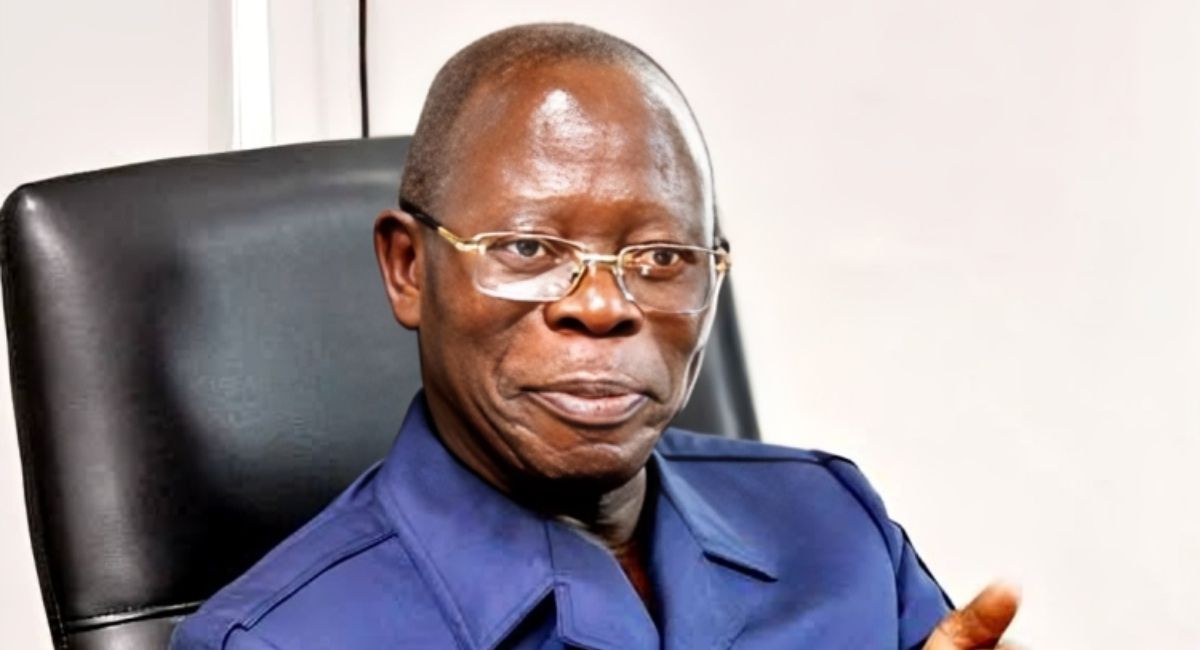By Adeola Olatunji
Copyright pulse

Born in Iyamho, Edo State, Adams Aliyu Oshiomhole rose from trade-union activism to become Nigeria’s labour leader, served two terms as Edo State governor, later chaired the All Progressives Congress (APC), and currently represents Edo North in the Senate.
Who Is Adams Oshiomhole?
Senator Adams Oshiomhole is a veteran Nigerian politician and former labour leader, currently serving as the senator for Edo North under the All Progressives Congress (APC).
Oshiomhole is best known for his tenure as national chairman of the APC and his leadership of the Nigerian Labour Congress (NLC).
Profile Summary
Adams Oshiomhole’s Early Life and Education
Adams Aliyu Oshiomhole was born on April 4, 1952, in Iyamho, near Auchi in old Bendel State, now Edo State. He came from a modest family and was initially raised in a Muslim household until his conversion to Christianity during his adult life.
He attended local primary and secondary schools in Edo State, demonstrating early academic promise and leadership qualities in student life. After secondary school, he secured employment with Arewa Textiles, Kaduna, where he became union secretary, a role that ushered him into full-time labour activism.
In 1975, he travelled to the United Kingdom to study at Ruskin College, Oxford, where he majored in labour economics within the industrial relations program. Later, in 1989, he attended the National Institute for Policy and Strategic Studies (NIPSS) in Kuru, Plateau State, becoming a member of the National Institute (MNI).
During his student years, he developed his interest in labour rights and built networks with union activists, laying the foundation for his eventual rise in Nigerian labour politics.
His Career Before Politics
After leaving student life, Oshiomhole returned to Nigeria and deepened his involvement in organised labour. In 1982, he was appointed General Secretary of the National Union of Textile, Garment and Tailoring Workers of Nigeria, representing over 75,000 workers.
He built a reputation as a tenacious and often uncompromising labour leader. In 1999, with the return of civilian rule, he was elected President of the Nigerian Labour Congress (NLC), a position he held until 2007.
During his tenure, he led high-profile nationwide strikes against fuel subsidy removals, pushed for public sector wage increases, and asserted the relevance of labour activism in national governance.
His performance in union leadership exposed him to national politics and set the stage for his transition into elective and party politics.
Adams Oshiomhole’s Political Career
His Entry into Politics
Oshiomhole’s shift into formal politics began in the mid-2000s. He joined the Action Congress (AC) and campaigned for the governorship of Edo State. In the 2007 contest, though initially declared a loser, he successfully challenged the result in court.
In 2008, the election tribunal and subsequently the Court of Appeal nullified the prior incumbent’s victory and declared Oshiomhole the duly elected governor.
His Major Political Roles
Governor of Edo State (2008–2016): He served two full terms.National Chairman, APC (2018–2020): He was elected national chairman of the ruling party in July 2018. However, his tenure ended in controversy when his suspension was affirmed by the Abuja Court of Appeal in June 2020.Senator for Edo North (2023–present): In the 2023 general elections, he contested and won the Edo North senatorial seat, defeating incumbent Francis Alimikhena.
Over the years in politics, he has switched from AC to APC (due to mergers) and been involved in internal party factionalism. He has also sponsored bills, participated in Senate committees, and remained an influential actor in national party dynamics.
Achievements and Impact
As governor, he undertook infrastructure development in Edo State, improved road networks, initiated rural electrification, and launched educational programs.In national politics, his bold style and confrontational posture have made him a polarising but visible figure.His leadership in labour set precedents for wage negotiations, workers’ rights advocacy, and public labour discourse.
Personal Life
Oshiomhole was first married to Clara Oshiomhole, who died of cancer in 2010; during that period, she had influenced his conversion to Christianity, as he was born a Muslim. In May 2015, he married Lara Fortes, a lawyer and top model from the Cape Verde Islands.
A father to five children, he is known for his outspoken style, strong rhetoric, and often combative public persona. He is also a popular figure among certain labour and political circles, though he remains controversial among critics who question the consistency between his labour roots and political behaviour.
Net Worth and Assets
Oshiomhole’s official net worth is not publicly disclosed. Various media sources and speculation suggest he has significant real estate holdings, business interests, and investments, but these are not reliably verified.
Notable Adams Oshiomole Quotes
“In this country, when you speak out, all the arrows will be fashioned to attack you. But I conquered fear at age 17, I cannot be intimidated.”“Lamenting and wallowing in self-pity won’t change things, things change when you do things differently, not when you perfect how to cry.””Once you join APC, all your sins are forgiven.”
Recent News and Updates
In June 2025, Oshiomhole was involved in a public altercation at Murtala Muhammed Airport in Lagos over a missed flight, which drew media attention. In the Senate, he remains active in debates, posture, and positioning within the APC’s internal dynamics, particularly in Edo State.He continues to be central in party disputes, labour negotiations, leadership contests, and interventions in state politics in the South-South and South-South zones.
Adams Oshiomhole remains one of Nigeria’s most recognisable political figures, bridging the worlds of labour activism and mainstream party politics. From his roots as a trade unionist to his governorship and party leadership, his trajectory typifies the tensions between populist reform and political pragmatism.
His legacy is contested, praised by supporters for his courage and developmental focus, criticised by opponents for internal party strife and perceived inconsistencies. Nonetheless, his imprint on Edo State politics and national party dynamics is indelible.